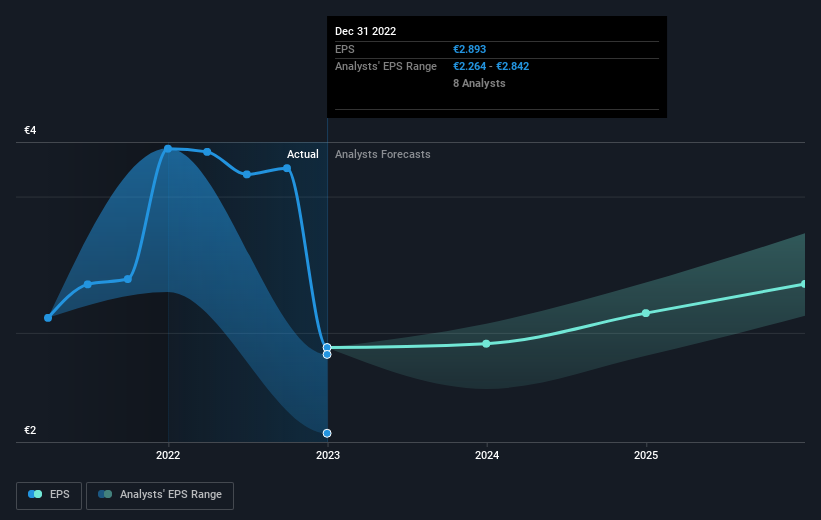- Italy
- /
- Capital Markets
- /
- BIT:AZM
Azimut Holding (BIT:AZM) sheds 4.6% this week, as yearly returns fall more in line with earnings growth

It might be of some concern to shareholders to see the Azimut Holding S.p.A. (BIT:AZM) share price down 13% in the last month. But that doesn't change the fact that the returns over the last three years have been respectable. In fact the stock is up 45%, which is better than the market return of 38%.
Since the long term performance has been good but there's been a recent pullback of 4.6%, let's check if the fundamentals match the share price.
See our latest analysis for Azimut Holding
While the efficient markets hypothesis continues to be taught by some, it has been proven that markets are over-reactive dynamic systems, and investors are not always rational. By comparing earnings per share (EPS) and share price changes over time, we can get a feel for how investor attitudes to a company have morphed over time.
Azimut Holding was able to grow its EPS at 2.9% per year over three years, sending the share price higher. This EPS growth is lower than the 13% average annual increase in the share price. This suggests that, as the business progressed over the last few years, it gained the confidence of market participants. That's not necessarily surprising considering the three-year track record of earnings growth.
You can see below how EPS has changed over time (discover the exact values by clicking on the image).

This free interactive report on Azimut Holding's earnings, revenue and cash flow is a great place to start, if you want to investigate the stock further.
What About Dividends?
As well as measuring the share price return, investors should also consider the total shareholder return (TSR). The TSR is a return calculation that accounts for the value of cash dividends (assuming that any dividend received was reinvested) and the calculated value of any discounted capital raisings and spin-offs. It's fair to say that the TSR gives a more complete picture for stocks that pay a dividend. In the case of Azimut Holding, it has a TSR of 75% for the last 3 years. That exceeds its share price return that we previously mentioned. And there's no prize for guessing that the dividend payments largely explain the divergence!
A Different Perspective
Azimut Holding shareholders are down 6.4% for the year (even including dividends), but the market itself is up 0.1%. Even the share prices of good stocks drop sometimes, but we want to see improvements in the fundamental metrics of a business, before getting too interested. Longer term investors wouldn't be so upset, since they would have made 9%, each year, over five years. It could be that the recent sell-off is an opportunity, so it may be worth checking the fundamental data for signs of a long term growth trend. It's always interesting to track share price performance over the longer term. But to understand Azimut Holding better, we need to consider many other factors. Case in point: We've spotted 1 warning sign for Azimut Holding you should be aware of.
Of course Azimut Holding may not be the best stock to buy. So you may wish to see this free collection of growth stocks.
Please note, the market returns quoted in this article reflect the market weighted average returns of stocks that currently trade on Italian exchanges.
New: Manage All Your Stock Portfolios in One Place
We've created the ultimate portfolio companion for stock investors, and it's free.
• Connect an unlimited number of Portfolios and see your total in one currency
• Be alerted to new Warning Signs or Risks via email or mobile
• Track the Fair Value of your stocks
Have feedback on this article? Concerned about the content? Get in touch with us directly. Alternatively, email editorial-team (at) simplywallst.com.
This article by Simply Wall St is general in nature. We provide commentary based on historical data and analyst forecasts only using an unbiased methodology and our articles are not intended to be financial advice. It does not constitute a recommendation to buy or sell any stock, and does not take account of your objectives, or your financial situation. We aim to bring you long-term focused analysis driven by fundamental data. Note that our analysis may not factor in the latest price-sensitive company announcements or qualitative material. Simply Wall St has no position in any stocks mentioned.
About BIT:AZM
Undervalued with excellent balance sheet and pays a dividend.
Similar Companies
Market Insights
Community Narratives



